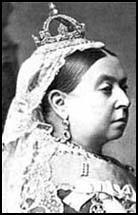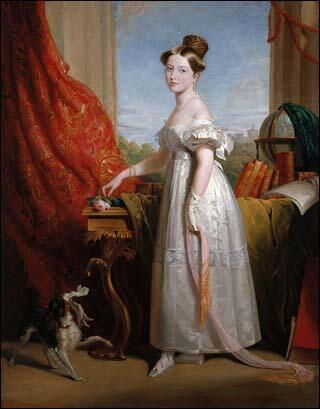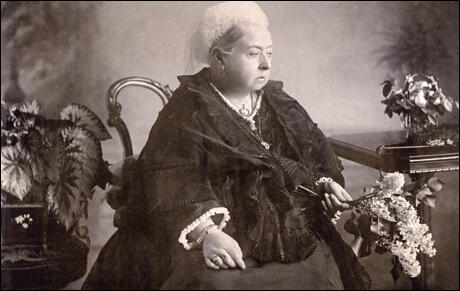Queen Victoria

Alexandrina Victoria, the only child of Edward, Duke of Kent and Victoria Maria Louisa of Saxe-Coburg, was born in 24th May 1819. The Duke of Kent was the fourth son of George III and Victoria Maria Louisa was the sister of King Leopold of Belgium. The Duke and Duchess of Kent selected the name Victoria but her uncle, George IV, insisted that she be named Alexandrina after her godfather, Tsar Alexander II of Russia.
Victoria's father died when she was eight months old. The Duchess of Kent developed a close relationship with Sir John Conroy, an ambitious Irish officer. Conroy acted as if Victoria was his daughter and had a major influence over her as a child.
On the death of George IV in 1830, his brother William IV became king. William had no surviving legitimate children and soVictoria, became his heir. William's health was not good and he feared that Conroy would become the power behind the throne if Victoria became queen before she was eighteen.
William IV died 27 days after Victoria's eighteenth birthday. Although William was unaware of this, Victoria disliked Conroy and she had objected to his attempt to exert power over her. As soon as she became queen in 1837, Victoria banished Conroy from the Royal Court.
Lord Melbourne was Prime Minister when Victoria became queen. Melbourne was fifty-eight and a widower. Melbourne's only child had died and he treated Victoria like his daughter. Queen Victoria grew very fond of Melbourne and became very dependent on him for political advice. Melbourne was leader of the Whig party and although radical in his youth, his views were now extremely conservative. Melbourne had been a member of Earl Grey's government that had passed the 1832 Reform Act, but he had privately been against the measure. Melbourne attempted to protect Victoria from the harsh realities of British life and even advised her not to read Oliver Twist by Charles Dickens because it dealt with "paupers, criminals and other unpleasant subjects".
Queen Victoria and Melbourne became very close. An apartment was made available for Lord Melbourne at Windsor Castle and it was estimated that he spent six hours a day with the queen. Victoria's feelings for Melbourne were clearly expressed in her journal. On one occasion she wrote: "he is such an honest, good kind-hearted man and is my friend, I know it."

Some people objected to this close relationship. When on royal visits, some members of the crowd would shout out "Mrs. Melbourne". Lord Melbourne's old friend, Thomas Barnes, the editor of The Times wrote "Is it for the Queen's service - is it for the Queen's dignity - is it becoming - is it commonly decent?" In the autumn of 1837 a rumour circulated that Victoria was considering marrying Lord Melbourne. Queen Victoria wrote in her diary that she was growing very fond of Melbourne and loved listening to him talk: "Such stories of knowledge; such a wonderful memory; he knows about everybody and everything; who they were and what they did. He has such a kind and agreeable manner; he does me the world of good."
In 1839 Lord Melbourne resigned after a defeat in the House of Commons. Sir Robert Peel, the Tory leader, now became Prime Minister. It was the custom for the Queen's ladies of the bedchamber to be of the same political party as the government. Peel asked Victoria to replace the Whig ladies with Tory ladies. When Victoria refused, Peel resigned and Melbourne and the Whigs returned to office.
Soon after the return of Lord Melbourne as Prime Minister, Victoria saw Lady Flora Hastings, one of her ladies-in-waiting, getting into a carriage with Sir John Conroy. A few months later Victoria noticed that Lady Hastings appeared to be pregnant. When Victoria approached Lady Hastings about this she claimed that she was still a virgin and had not had a sexual relationship with Conroy. Victoria refused to believe her and insisted that she submitted to a medical examination. The queen's doctor discovered that Lady Hastings was indeed a virgin and that the swelling was caused by a cancerous growth on the liver. The story was leaked to the newspapers and when Lady Hastings died of cancer a few months later, Victoria became very unpopular with the British public. Soon afterwards an attempt was made to kill Victoria while she was driving in her carriage in London. Further assassination attempts took place in 1842 (twice), 1849, 1850, 1872 and 1882.
Queen Victoria's cousin, Prince Albert of Saxe-Coburg, visited London in 1839. Victoria immediately fell in love with Albert and although he initially had doubts about the relationship, the couple were eventually married in February 1840. During the next eighteen years Queen Victoria gave birth to nine children.
Lord Melbourne resigned as Prime Minister in 1841. However, by this time, it was Prince Albert, rather than Melbourne, who had become the main influence over Victoria's political views. Whereas Melbourne had advised Victoria not to think about social problems, Prince Albert invited Lord Ashley to Buckingham Palace to talk about what he had discovered about child labour in Britain.
Queen Victoria had a good relationship with the next two prime ministers, Sir Robert Peel and Lord John Russell. However, she disapproved of Lord Palmerston, the Foreign Secretary. Palmerston believed the main objective of the government's foreign policy should be to increase Britain's power in the world. This sometimes involved adopting policies that embarrassed and weakened foreign governments. Queen Victoria and Prince Albert, on the other hand, believed that the British government should do what it could to help preserve European royal families against revolutionary groups advocating republicanism. This was very important to Victoria and Albert as they were closely related to several of the European royal families that faced the danger of being overthrown.
Victoria and Albert also objected to Palmerston's sexual behaviour. On one occasion he had attempted to seduce one of Victoria's ladies in waiting. Palmerston entered Lady Dacre's bedroom while staying as Queen Victoria's guest at Windsor Castle. Only Lord Melbourne's intervention saved Palmerston from being removed from office.
In the summer of 1850 Queen Victoria asked Lord John Russell to dismiss Palmerston. Russell told the queen he was unable to do this because Palmerston was very popular in the House of Commons. However, in December 1851, Lord Palmerston congratulated Louis Napoleon Bonaparte on his coup in France. This action upset Russell and other radical members of the Whig party and this time he accepted Victoria's advice and sacked Palmerston. Six weeks later Palmerston took revenge by helping to bring down Lord John Russell's government.
In 1855 Lord Palmerston became Prime Minister. Queen Victoria found it difficult to work with him but their relationship gradually improved. When Palmerston died she wrote in her journal: "We had, God knows! terrible trouble with him about Foreign Affairs. Still, as Prime Minister he managed affairs at home well, and behaved to me well. But I never liked him."
Prince Albert died of typhoid fever in December 1861. Victoria continued to carry out her constitutional duties such as reading all diplomatic despatches. However, she completely withdrew from public view and now spent most of her time in the Scottish Highlands at her home at Balmoral Castle. Victoria even refused requests from her government to open Parliament in person. Politicians began to question whether Victoria was earning the money that the State paid her.
While at Balmoral Queen Victoria became very close to John Brown, a Scottish servant. Victoria's friendship with Brown caused some concern and rumours began to circulate that the two had secretly married. Hostility towards Victoria increased and some Radical MPs even spoke in favour of abolishing the British monarchy and replacing it with a republic.
In 1868 William Gladstone, leader of the Liberals in the House of Commons, became Prime Minister. Gladstone's government had plans for a series of reforms including the extension of the franchise, elections by secret ballot and a reduction in the power of the House of Lords. Victoria totally disagreed with these policies but did not have the power to stop Gladstone's government from passing the 1872 Secret Ballot Act.

In 1874 the Tory, Benjamin Disraeli, became Prime Minister. Victoria much preferred Disraeli's conservatism to Gladstone's liberalism. Victoria also approved of Disraeli's charm. Disraeli later remarked that: "Everyone likes flattery, and when you come to royalty, you should lay it on with a trowel." Queen Victoria was very upset when Gladstone replaced Disraeli as premier in 1880. When Disraeli died the following year, Victoria wrote to his private secretary that she was devastated by the news and could not stop crying.
Gladstone's relationship with Victoria failed to improve. As well as her objection to the 1884 Reform Act, Victoria disagreed with Gladstone's foreign policy. William Gladstone believed that Britain should never support a cause that was morally wrong. Victoria took the view that not to pursue Britain's best interest was not only misguided, but close to treachery. In 1885 Victoria sent a telegram to Gladstone criticizing his failure to take action to save General Gordon at Khartoum. Gladstone was furious because the telegram was uncoded and delivered by a local station-master. As a result of this telegram it became public knowledge that Victoria disapproved of Gladstone's foreign policy. The relationship became even more strained when Gladstone discovered that Victoria was passing on confidential documents to the Marquess of Salisbury, the leader of the Conservatives.
In 1885 the Marquess of Salisbury became Prime Minister. He was to remain in power for twelve of the last fifteen years of her reign. Victoria shared Salisbury's imperialist views and was thrilled when General Kitchener was successful in avenging General Gordon in the Sudan in 1898. Victoria also enthusiastically supported British action against the Boers in South Africa.
Queen Victoria died at her house on the Isle of Wight on 22nd January 1901.
Primary Sources
(1) Charles Greville, Clerk of the Privy Council, described a meeting between William IV and Victoria in August 1836.
When the King arrived at Windsor and went into the drawing room (at about ten o'clock at night), where the whole party was assembled, he went up to Princess Victoria, took hold of both her hands and expressed his pleasure at seeing her there and his regret at not seeing her oftener.
The next day it was his birthday, and though the celebration was what was called private, there were a hundred people at dinner, either belonging to the Court or from the neighbourhood. The Duchess of Kent sat on one side of the King and one of his sisters on the other, the Princess Victoria opposite. After dinner the King made a very long speech, in the course of which he poured forth the following extraordinary tirade: "I trust in God that my life may be spared for nine months longer, after which period, in the event of my death, no regency would take place. I should then have the satisfaction of leaving the royal authority to the personal exercise of that young lady (pointing to the princess) the heiress presumptive of the Crown, and not in the hands of a person near me, who is surrounded by evil advisers, and who is herself incompetent to act with propriety in the station in which she would be placed."
This awful speech (with a great deal more which I forget) was uttered in a loud voice and excited manner. The Queen Adelaide looked in great distress, the Princess burst into tears, and the whole company was aghast. The Duchess of Kent said not a word. It was an unparalled outrage from a man to a woman, from a host to his guest, and to the last degree unbecoming the situation they both of them fill.
(2) Charles Greville, Clerk of the Privy Council, described Queen Victoria's relationship with Lord Palmerston in his diary.
28th August 1853: Nothing will induce Her Majesty to have Palmerston as Prime Minister. There are old offences, when he was at the Foreign Office, which sunk deep into her mind, and besides this the recollection of his conduct before her marriage, when in her own palace he made an attempt on the person of one of her ladies, which she very justly resented as an outrage to herself. Palmerston, always enterprising and audacious with women, took a fancy to Lady Dacre and at Windsor Castle, where she was in waiting and he a guest, he marched into her room one night. His tender temerity met with an invincible resistance. The lady did not conceal his attempt and it came to the Queen's ears. Her indignation was somehow pacified by Melbourne, then all-powerful. Palmerston got out of the scrape with his luck, but the Queen has never forgotten and will never forgive it.
(3) Prince Albert talked to Lord John Russell about the Lady Dacre incident when he asked for Lord Palmerston to be sacked as Foreign Secretary in the summer of 1850.
How could the Queen consent to take a man as an adviser and confidential counsellor in all matters of State, religion, society, Court, etc., etc., he who as her Secretary of State and while a guest under her roof at Windsor Castle had committed a brutal attack upon one of her ladies? Had at night by stealth introduced himself into her apartment, barricaded afterwards the door and would have consummated his fiendish scheme by violence had not the miraculous efforts of his victim and such assistance attracted by her screams saved her.

